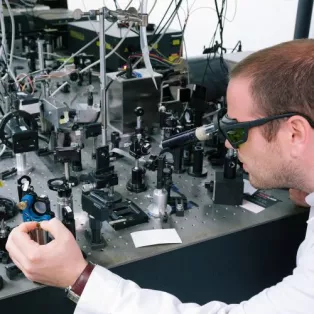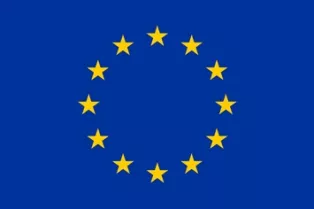PhD project in call 3, chemical physics: coherent spectroscopy
Coherent spectroscopy of new quantum solar energy materials
Subject: Studies of light-induced processes in a variety of the materials, including molecules, biological complexes, polymers, semiconductors and metallic nanostructures, as well as composite materials. Main focus is on fundamental science with potential applications.
Experimental: We will apply multi-pulse ultrafast spectroscopy and make use of the coherence between the pulses. We will also investigate the possibilities how to use quantum light (entangled photons) and pulse shaping in spectroscopy.
Introduction
The Faculty of Science at Lund University conducts research and education within Biology, Astronomy, Physics, Geosciences, Chemistry, Mathematics and Environmental Sciences. The Faculty is organized into nine departments, gathered in the northern campus area. The Faculty has approximately 1500 students, 330 PhD students and 700 employees.
The Division of Chemical Physics at the Natural Science Faculty consists of approximately 50 researchers and students located at the Kemicentrum in north-eastern Lund. The research topics explored by the group range from novel synthesis routes to cutting-edge photovoltaics and ultrafast spectroscopic analysis.
This project is placed in the group lead by Tönu Pullerits.
See Pullerits group page for information about the activity and members of the group
Project specification
Subject description
Studies of light-induced processes in a variety of the materials, including molecules, biological complexes, polymers, semiconductors and metallic nanostructures, as well as composite materials. Main focus is on fundamental science with potential applications. The subject area includes exploring mechanisms of elementary photophysical and photochemical processes at interfaces and in solution. One of the directions concerns with investigating properties of novel materials for energy conversion and photocatalysis with particular focus to nanomaterials. Development and implementation of new optical instrumentation and spectroscopic methods are parts of the subject. Additionally, computational studies of transport and optical response based on quantum description of dynamics are also covered.
Work duties
The project is about coherent spectroscopy of new quantum solar energy materials. The weight here is on spectroscopy while the materials will be mainly made in collaboration with other groups. We will apply multi-pulse ultrafast spectroscopy and make use of the coherence between the pulses. We will also investigate the possibilities how to use quantum light (entangled photons) and pulse shaping in spectroscopy. The work will mainly be experimental. We will be using and improving the existing multidimensional ultrafast spectroscopy experimental setup. We will be investigating collective phenomena in nanostructured quantum materials. Also the possibilities to use entanglement of photons as a resource in spectroscopy of the quantum materials. Important part of the work is data analyses and interpretation.
The main duties of doctoral students are to devote themselves to their research studies which includes participating in research projects and third cycle courses. The work duties can also include teaching and other departmental duties (no more than 20%).
Admission requirements
A person meets the general admission requirements for third-cycle courses and study programmes if he or she:
- has been awarded an undergraduate qualification, or
- has satisfied the requirements for courses comprising at least 240 credits of which at least 60 credits were awarded in the second cycle, or
- has acquired substantially equivalent knowledge in some other way in Sweden or abroad.
A person meets the specific admission requirements for third cycle studies in chemical physics if he or she has:
A minimum of 120 credits from natural science (for example chemistry or physics) and chemical and physical engineering courses, of which at least 30 credits from a second-cycle degree project (or equivalent) in chemical physics, physical chemistry or a related specialisation. The specific admission requirements can also be fulfilled through another equivalent programme, which is assessed in each specific case.
Additional requirements
- Very good oral and written proficiency in English.
- Good communication skills, collaborative
- High level of independence
Assessment criteria
Selection for third-cycle studies is based on the student’s potential to profit from such studies. The assessment of potential is made primarily on the basis of academic results from the first and second cycle. Special attention is paid to the following:
Knowledge and skills relevant to the thesis project and the subject of study. An assessment of ability to work independently and to formulate and tackle research problems. Written and oral communication skills. Other experience relevant to the third-cycle studies, e.g. professional experience.
Other assessment criteria
- Previous experience with using femtosecond laser pulses is a strong merit,
- Experience with computer programming and data analyses are meriting,
- The position is partially funded by the MSCA Cofund project GenerationNano (H2020 GA no 945378) and therefore the candidate must not have lived or worked in Sweden for more than 12 months in the last 3 years,
- The candidate must be an early stage researcher, (i.e. in the first four years of their research careers and not have a doctoral degree).
Consideration will also be given to good collaborative skills, drive and independence, and how the applicant, through his or her experience and skills, is deemed to have the abilities necessary for successfully completing the third cycle programme.
Enrolment: Chemical Physics at the Science Faculty
The general syllabi list everything that needs to be done in order to obtain a doctoral degree. New general syllabi for students admitted after 1 January 2021 will be available soon.
General syllabi and individual study plans at the Science Faculty
Meanwhile, you can check the curriculum from 2019 to get a general picture of what is included
Supervisor
Homepage of Tönu Pullerits, Prof. at the Div. of Chemical Physics
Acknowledgement
The GenerationNano project has received funding from the European Union’s Horizon 2020 research and innovation programme under the Marie Skłodowska-Curie grant agreement No 945378
Positions in the 1st call
The call was open from 23 March until 4 May 2020. Of the ten PhD students that were successfully recruited in this call, eight are eligible for GenerationNano funding.
- Smart nanomaterials for green-tech applications
- Characterization of nanostructured magnetic materials
- PhD project on information as fuel
- Photon detection & sustainable energy
- Ultrafast spectroscopy for new solar energy solutions
- Biomarker detection by optical sensing with nanowires
- Morphology and virulence among bacteria
- Multiscale biomechanics from molecules to cells in cancer
- Solubility of amyloid beta peptide (up to two positions)
- Nanoparticles in the brain: multitalented drug carriers to target neurodegenerative disease
Positions in the 2nd call
The call was open from 25 June to 25 August 2020. Six PhD students were recruited, among them five are eligible for GenerationNano funding. Three of the GenerationNano students have recently started their employment and the two remaining will start soon.



